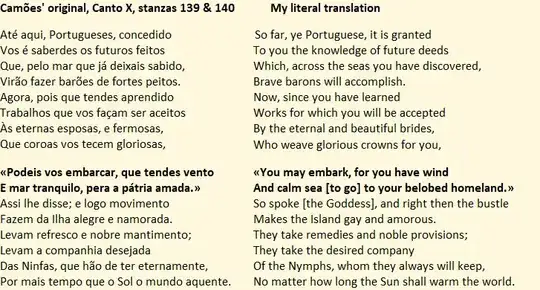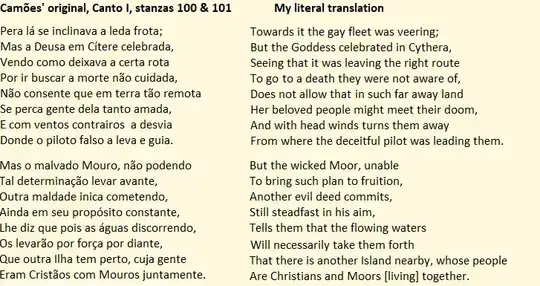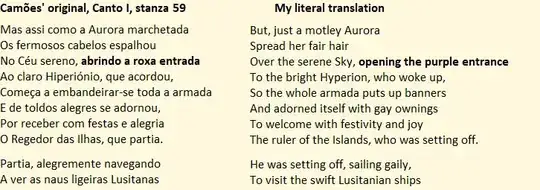I’ve found your passages, but Mickle’s is a rather free translation, so the six verses of your first passage are an elaboration on just two verses in the original. I had to look at the surrounding text to make sure I was on the right spot. So I give below an expanded quote, first of Mickle’s translation, and below Camões’ original and my literal translation side by side, so you can check for yourself. I tried to translate verse for verse for better comparison, so the output may sound a little awkward at times, but I hope it is understandable. Your quote is in boldface; the matching original material is in Book X, stanza 140.
Mickle’s translation, Book (Canto) X, p. 480-82
Thus far, O favour'd Lusians, bounteous Heav'n
Your nation's glories to your view has giv'n.
What ensigns, blazing to the morn, pursue
The path of heroes, open’d first by you!
Still be it yours the first in fame to shine:
Thus shall your brides new chaplets still entwine,
With laurels ever new your brows enfold,
And braid your wavy locks with radiant gold.
How calm the waves, how mild the balmy gale!
The halcyons call; ye Lusians, spread the sail;
Old ocean, now appeas'd, shall rage no more.
Haste, point the bowsprit to your native shore:
Soon shall the transports of the natal soil
O'erwhelm, in bounding joy, the thoughts of every toil.
The goddess spake; and VASCO waved his hand,
And soon the joyful heroes crowd the strand.
The lofty ships with deepen'd burthens prove
The various bounties of the Isle of Love.
Nor leave the youths their lovely brides behind,
In wedded bands, while time glides on, conjoin'd;

Again, you have below, first Mickle’s translation, and the Camões’ original and my literal translation. The two verses you quote (highlighted below in boldface) do not match anything in the original. Mickle just told broadly the same story, but added details that are not found in the original. Background: a Moor pilot is leading the Portuguese to a deadly trap.
Mickle’s translation, Book (Canto) I, p. 38-9
Right to the land the faithless pilot steers,
Right to the land the glad Armada bears;
But heavenly Love's fair queen, whose watchful care
Had ever been their guide, beheld the snare.
A sudden storm she rais'd: loud howl'd the blast,
The yard-arms rattled, and each groaning mast
Bended beneath the weight. Deep sunk the prows,
And creaking ropes the creaking ropes oppose;
In vain the pilot would the speed restrain,
The captain shouts, the sailors toil in vain;
Aslope and gliding on the leeward side,
The bounding vessels cut the roaring tide:
Soon far they pass'd; and now the slacken'd sail
Trembles and bellies to the gentle gale:
Now many a league before the tempest toss'd
The treach'rous pilot sees his purpose cross'd:
Yet vengeful still, and still intent on guile,
Behold, he cries, yon dim emerging isle:
There live the votaries of Messiah's lore
In faithful peace, and friendship with the Moor.

Your third passage is from Book I, stanza 59. Again the first verse of your quote is just a detail Mickle added.
Mickle’s translation, Book (Canto) I, p. 24
Aurora now, with dewy lustre bright,
Appears, ascending on the rear of night.
With gentle hand, as seeming oft to pause,
The purple curtains of the morn she draws;
The sun comes forth, and soon the joyful crew,
Each aiding each, their joyful tasks pursue.
Wide o'er the decks the spreading sails they throw;
From each tall mast the waving streamers flow;
All seems a festive holiday on board
To welcome to the fleet the island's lord.
With equal joy the regent sails to meet,
And brings fresh cates, his off'rings, to the fleet:



